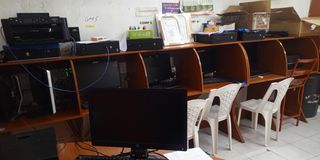Biz Lounge: How Nakuru cybercafés are reinventing to survive

Humphrey Chemjor working at his Cyber cafe on May 15,2025.
Before the rise of wide-screen, internet-enabled mobile phones, cybercafés were the go-to places for a range of internet-related services.
From printing documents and accessing emails to online gaming and updating social media, cybercafés were once essential hubs for digital needs.
But with the rapid advancement in mobile phone technology and the availability of fast internet, cybercafé businesses are slowly becoming obsolete.
In Nakuru, the cybercafés still in operation have had to adapt and get creative to stay afloat, with owners reporting significant drops in customer numbers.
Mary Muthoni, who owns Series Printers Cyber in Nakuru town, reflects on how much her business has changed over the past eight years.
When she first opened, her shop was her primary source of income. Customers would line up for browsing, typing, email setup, and social media account services.
“I used to have people lining up. The money came from browsing charges, typing, and helping customers set up email and social media accounts,” she says.

Inside a cyber cafe in Nakuru city. Photo taken on 15th May 2025
With fewer customers today, she has diversified her services to include design work for items such as banners, eulogies, and wedding invitations.
She adds that while the digital migration of government services has brought in more clients, it also comes with challenges.
“The shift to online government services was a huge relief because it meant more people would come in for help. But the platforms are often down, which frustrates customers. Many of them now only visit us when they need to print documents or access services that aren’t easily available on a smartphone. So the workflow is lower than it used to be,” she explains.
Muthoni also mentions that there's been a noticeable increase in parents seeking printing services for Competency-Based Curriculum (CBC) homework.
"I charge my service from Sh. 5 for photocopying, being the least charged, and the charges increase depending on the amount of work required and the quantity of the materials needed. I work with my partner, and sometimes I occasionally hire a casual labourer to help deliver materials to clients," she says
Muthoni has since complemented her business by selling books, tags, and printing materials.
On the other hand, Humphrey Chemjor began running a cybercafé in 2020, shortly after completing university, at a time when the digital shift was already underway.
He says he has managed to remain competitive largely because of his café’s strategic location, nestled among several government offices.
He says this positioning has helped him serve clients who need help accessing services like Kenya Revenue Authority registration, passport applications, and police clearance certificates.
“People don’t come in for browsing or email services like before. Now, it’s mostly bulk typing and government-related services. NTSA services are especially popular at my café,” he says.
Humphrey has four desktops in his café but admits that their usage has declined. To stay relevant, he has diversified into photography, turning his business into a one-stop shop for digital services.
He notes that most of the service charges have remained steady, ranging between Sh. 5 and Sh. 2,000, though prices may rise occasionally when there is demand for new or specialized services.
Nakuru resident Rose Bella Oruko says that although she rarely visits cybercafés, she still finds them useful for specific tasks.

Rose Bella Oruko poses for a photo after an interview with Mtaa Wangu in Nakuru city on 15th May 2025.
“Phones are useful, and most people rely on them, but some tasks are hard to do on a phone. That’s why I went to the cybercafé this week—to prepare letters and a proposal,” she says.
She also notes that the number of people using cybercafés has dropped significantly over the years.
Malcolm Onyango still relies on cybercafés for tasks that require more precision and efficiency than what a mobile phone can offer.
While smartphones are useful for quick browsing and communication, Malcolm finds the larger screen essential for completing his work efficiently.
Additionally, Malcolm appreciates the structured environment a cybercafé provides, which helps him stay focused compared to working from home or in public spaces.
It is clear that while general browsing has declined, cybercafés still hold value for various tasks.


